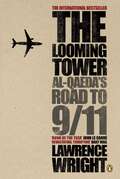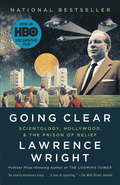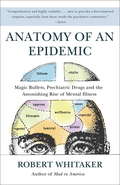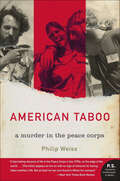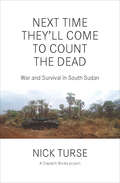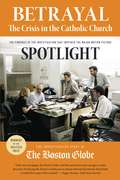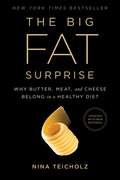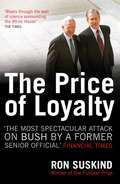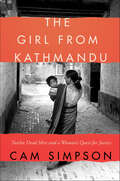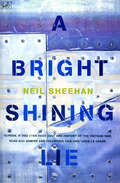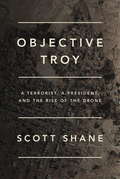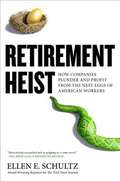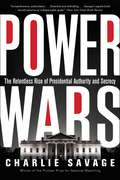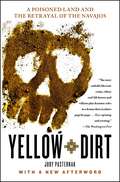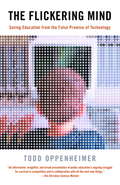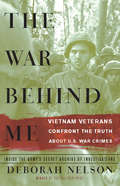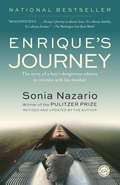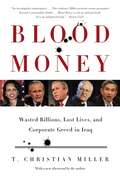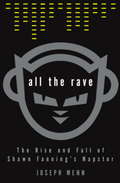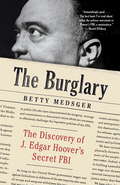Special Collections
Investigative Reporters and Editors Award
Description: The annual IRE Awards recognize outstanding investigative work and help identify the techniques and resources used to complete each story. This collection includes award winners and finalists. #award
- Table View
- List View
The Looming Tower
by Lawrence WrightTHE PULITZER PRIZE-WINNING BESTSELLER, NOW A MAJOR NEW TV SERIESThis is the definitive account of the run-up to 9/11: from the man who lit the spark of radical Islam in 1948, to those who built up a terror network, and to the FBI agent whose warnings of 'something big' coming were ignored until the Twin Towers fell.'The Looming Tower is a thriller. And it's a tragedy, too' The New York Times'The most detailed (and thrilling) account we have of the events that led to the destruction of the Twin Towers' Observer, Books of the Year'Possibly the best book yet written on the rise of al-Qaeda ... beautifully written and wonderfully compelling' William Dalrymple'We meet some formidable schemers and killers ... fabulists crazed with blood and death' Martin Amis
Going Clear
by Lawrence WrightA clear-sighted revelation, a deep penetration into the world of Scientology by the Pulitzer Prize-winning author of The Looming Tower, the now-classic study of al-Qaeda's 9/11 attack. Based on more than two hundred personal interviews with current and former Scientologists--both famous and less well known--and years of archival research, Lawrence Wright uses his extraordinary investigative ability to uncover for us the inner workings of the Church of Scientology.At the book's center, two men whom Wright brings vividly to life, showing how they have made Scientology what it is today: The darkly brilliant science-fiction writer L. Ron Hubbard, whose restless, expansive mind invented a new religion. And his successor, David Miscavige--tough and driven, with the unenviable task of preserving the church after the death of Hubbard.We learn about Scientology's complicated cosmology and special language. We see the ways in which the church pursues celebrities, such as Tom Cruise and John Travolta, and how such stars are used to advance the church's goals. And we meet the young idealists who have joined the Sea Org, the church's clergy, signing up with a billion-year contract.In Going Clear, Wright examines what fundamentally makes a religion a religion, and whether Scientology is, in fact, deserving of this constitutional protection. Employing all his exceptional journalistic skills of observation, understanding, and shaping a story into a compelling narrative, Lawrence Wright has given us an evenhanded yet keenly incisive book that reveals the very essence of what makes Scientology the institution it is.From the Hardcover edition.
Anatomy of an Epidemic
by Robert WhitakerIn this astonishing and startling book, award-winning science and history writer Robert Whitaker investigates a medical mystery: Why has the number of disabled mentally ill in the United States tripled over the past two decades? Every day, 1,100 adults and children are added to the government disability rolls because they have become newly disabled by mental illness, with this epidemic spreading most rapidly among our nation’s children. What is going on?
Anatomy of an Epidemic challenges readers to think through that question themselves. First, Whitaker investigates what is known today about the biological causes of mental disorders. Do psychiatric medications fix “chemical imbalances” in the brain, or do they, in fact, create them? Researchers spent decades studying that question, and by the late 1980s, they had their answer. Readers will be startled—and dismayed—to discover what was reported in the scientific journals.
Then comes the scientific query at the heart of this book: During the past fifty years, when investigators looked at how psychiatric drugs affected long-term outcomes, what did they find? Did they discover that the drugs help people stay well? Function better? Enjoy good physical health? Or did they find that these medications, for some paradoxical reason, increase the likelihood that people will become chronically ill, less able to function well, more prone to physical illness?
This is the first book to look at the merits of psychiatric medications through the prism of long-term results. Are long-term recovery rates higher for medicated or unmedicated schizophrenia patients? Does taking an antidepressant decrease or increase the risk that a depressed person will become disabled by the disorder? Do bipolar patients fare better today than they did forty years ago, or much worse? When the National Institute of Mental Health (NIMH) studied the long-term outcomes of children with ADHD, did they determine that stimulants provide any benefit?
By the end of this review of the outcomes literature, readers are certain to have a haunting question of their own: Why have the results from these long-term studies—all of which point to the same startling conclusion—been kept from the public?
In this compelling history, Whitaker also tells the personal stories of children and adults swept up in this epidemic. Finally, he reports on innovative programs of psychiatric care in Europe and the United States that are producing good long-term outcomes. Our nation has been hit by an epidemic of disabling mental illness, and yet, as Anatomy of an Epidemic reveals, the medical blueprints for curbing that epidemic have already been drawn up.
American Taboo
by Philip Weiss“The story of how [Dennis Priven] got away with murder . . . a fascinating diorama of life in the Peace Corps in the 1970s, on the edge of the world.” —The New York Times Book ReviewIn 1975, a new group of Peace Corps volunteers landed on the island nation of Tonga. Among them was Deborah Gardner—a beautiful twenty-three-year-old who, in the following year, would be stabbed twenty-two times and left for dead inside her hut.Another volunteer turned himself in to the Tongan police, and many of the other Americans were sure he had committed the crime. But with the aid of the State Department, he returned home a free man. Although the story was kept quiet in the United States, Deb Gardner’s death and the outlandish aftermath took on legendary proportions in Tonga.Now journalist Philip Weiss “shines daylight on the facts of this ugly case with the fervor of an avenging angel” (Chicago Tribune), exposing a gripping tale of love, violence, and clashing ideals. With bravura reporting and vivid, novelistic prose, Weiss transforms a Polynesian legend into a singular artifact of American history and a profoundly moving human story.“This meticulously deconstructed tale of a Peace Corps volunteer murdering another in Tonga and basically getting away with it has to be one of the most exotic true-crime books of recent years, and one of the saddest.” —The Washington Post“[A] compelling and disturbing exposé . . . even novice true crime readers will find this a gripping and deeply sad story that will do little to bolster faith in the U.S. government’s ethical priorities.” —Publishers Weekly (starred review)
Betrayal
by The Investigative Staff of the Boston GlobeWinner of the Pulitzer Prize for Public ServiceThe story behind this groundbreaking book--one of the most significant works of investigative journalism since Woodward and Bernstein's reporting on Watergate--has been brought brilliantly to life on the screen in the major new movie Spotlight.Here are the devastating revelations that triggered a crisis within the Catholic Church. Here is the truth about the scores of abusive priests who preyed upon innocent children and the cabal of senior Church officials who covered up their crimes. Here is the trail of "hush money" that the Catholic Church secretly paid to buy victims' silence--deeds that left millions of the faithful in the U.S. and around the world shocked, angry, and confused. Here as well is a vivid account of the ongoing struggle, as Catholics confront their Church and call for sweeping change.
The Big Fat Surprise
by Nina TeicholzA New York Times bestseller Named one of The Economist's Books of the Year 2014 Named one of The Wall Street Journal's Top Ten Best Nonfiction Books of 2014 Kirkus Reviews Best Nonfiction Books of 2014 Forbes's Most Memorable Healthcare Book of 2014 In The Big Fat Surprise, investigative journalist Nina Teicholz reveals the unthinkable: that everything we thought we knew about dietary fat is wrong. She documents how the low-fat nutrition advice of the past sixty years has amounted to a vast uncontrolled experiment on the entire population, with disastrous consequences for our health.For decades, we have been told that the best possible diet involves cutting back on fat, especially saturated fat, and that if we are not getting healthier or thinner it must be because we are not trying hard enough. But what if the low-fat diet is itself the problem? What if the very foods we've been denying ourselves--the creamy cheeses, the sizzling steaks--are themselves the key to reversing the epidemics of obesity, diabetes, and heart disease? In this captivating, vibrant, and convincing narrative, based on a nine-year-long investigation, Teicholz shows how the misinformation about saturated fats took hold in the scientific community and the public imagination, and how recent findings have overturned these beliefs. She explains why the Mediterranean Diet is not the healthiest, and how we might be replacing trans fats with something even worse. This startling history demonstrates how nutrition science has gotten it so wrong: how overzealous researchers, through a combination of ego, bias, and premature institutional consensus, have allowed dangerous misrepresentations to become dietary dogma. With eye-opening scientific rigor, The Big Fat Surprise upends the conventional wisdom about all fats with the groundbreaking claim that more, not less, dietary fat--including saturated fat--is what leads to better health and wellness. Science shows that we have been needlessly avoiding meat, cheese, whole milk, and eggs for decades and that we can now, guilt-free, welcome these delicious foods back into our lives.
The Price of Loyalty
by Ron SuskindA devestating account of the inner workings of the George W. Bush administration, written with the extensive cooperation of former U.S. Treasury Secretary Paul O'Neill. As readers are taken to the very epicentre of government, this news-making book offers a definitive view of Bush and his closest advisers as they manage crucial domestic policies and global strategies within the most secretive White House of modern times.
Blowback
by Christopher SimpsonA searing account of a dark &“chapter in U.S. Cold War history . . . to help the anti-Soviet aims of American intelligence and national security agencies&” (Library Journal). Even before the final shots of World War II were fired, another war began—a cold war that pitted the United States against its former ally, the Soviet Union. As the Soviets consolidated power in Eastern Europe, the CIA scrambled to gain the upper hand against new enemies worldwide. To this end, senior officials at the CIA, National Security Council, and other elements of the emerging US national security state turned to thousands of former Nazis, Waffen Secret Service, and Nazi collaborators for propaganda, psychological warfare, and military operations. Many new recruits were clearly responsible for the deaths of countless innocents as part of Adolph Hitler&’s &“Final Solution,&” yet were whitewashed and claimed to be valuable intelligence assets. Unrepentant mass murderers were secretly accepted into the American fold, their crimes forgotten and forgiven with the willing complicity of the US government.Blowback is the first thorough, scholarly study of the US government&’s extensive recruitment of Nazis and fascist collaborators right after the war. Although others have approached the topic since, Simpson&’s book remains the essential starting point. The author demonstrates how this secret policy of collaboration only served to intensify the Cold War and has had lasting detrimental effects on the American government and society that endure to this day.
The Girl from Kathmandu
by Cam SimpsonNew York Times Book Review Editor's ChoiceThe shocking story of the massacre of a group of Nepalese men working as Defense contractors for the United States Government during the Iraq War, and the widow who dedicated her life to finding justice for her husband and the other victims—a riveting tale of courageous heroes, corporate war profiteers, international business, exploitation, trafficking, and human rights in the age of global capitalism that reveals how modern power truly works.In August of 2004, twelve men left their village in Nepal for jobs at a five-star luxury hotel in Amman, Jordan. They had no idea that they had actually been hired for sub-contract work on an American military base in Iraq. But fate took an even darker turn when the dozen men were kidnapped and murdered by Islamic extremists. Their gruesome deaths were captured in one of the first graphic execution videos disseminated on the web—the largest massacre of contractors during the war. Compounding the tragedy, their deaths received little notice.Why were these men, from a remote country far removed from the war, in Iraq? How had they gotten there? Who were they working for? Consumed by these questions, award-winning investigative journalist Cam Simpson embarked on a journey to find answers, a decade-long odyssey that would uncover a web of evil spanning the globe—and trigger a chain of events involving one brave young widow, three indefatigable human rights lawyers, and a formidable multinational corporation with deep governmental ties.A heart-rending, page-turning narrative that moves from the Himalayas to the Middle East to Houston and culminates in an epic court battle, The Girl from Kathmandu is a story of death and life—of the war in Iraq, the killings of the twelve Nepalese, a journalist determined to uncover the truth, and a trio of human rights lawyers dedicated to finding justice. At its heart is one unforgettable young woman, Kamala Magar, who found the courage to face the influential men who sent her husband to his death—a model of strength hope, bravery, and an unbreakable spirit who reminds us of the power we all have to make a difference.
A Bright Shining Lie
by Neil SheehanOutspoken, professional and fearless, Lt. Col. John Paul Vann went to Vietnam in 1962, full of confidence in America's might and right to prevail. He was soon appalled by the South Vietnamese troops' unwillingness to fight, by their random slaughter of civilians and by the arrogance and corruption of the US military. He flouted his supervisors and leaked his sharply pessimistic - and, as it turned out, accurate - assessments to the US press corps in Saigon. Among them was Sheehan, who became fascinated by the angry Vann, befriended him and followed his tragic and reckless career.Sixteen years in the making, A Bright Shining Lie is an eloquent and disturbing portrait of a man who in many ways personified the US war effort in Vietnam, of a solider cast in the heroic mould, an American Lawrence of Arabia. Blunt, idealistic, patronising to the Vietnamese, Vann was haunted by a shameful secret - the fact that he was the illegitimate son of a 'white trash' prostitute. Gambling away his career, Vann left the army that he loved and returned to Vietnam as a civilian in the pacification programme. He rose to become the first American civilian to wield a general's command in war. When he was killed in 1972, he was mourned at Arlington cemetery by leading political figures of the day. Sheehan recounts his astonishing story in this intimate and intense meditation on a conflict that scarred the conscience of a nation.
Objective Troy
by Scott ShaneObjective Troy tells the gripping and unsettling story of Anwar al-Awlaki, the once-celebrated American imam who called for moderation after 9/11, a man who ultimately directed his outsized talents to the mass murder of his fellow citizens. It follows Barack Obama's campaign against the excesses of the Bush counterterrorism programs and his eventual embrace of the targeted killing of suspected militants. And it recounts how the president directed the mammoth machinery of spy agencies to hunt Awlaki down in a frantic, multi-million-dollar pursuit that would end with the death of Awlaki by a bizarre, robotic technology that is changing warfare--the drone. Scott Shane, who has covered terrorism for The New York Times over the last decade, weaves the clash between president and terrorist into both a riveting narrative and a deeply human account of the defining conflict of our era. Awlaki, who directed a plot that almost derailed Obama's presidency, and then taunted him from his desert hideouts, will go down in history as the first United States citizen deliberately hunted and assassinated by his own government without trial. But his eloquent calls to jihad, amplified by YouTube, continue to lure young Westerners into terrorism--resulting in tragedies from the Boston marathon bombing to the murder of cartoonists at a Paris weekly. Awlaki's life and death show how profoundly America has been changed by the threat of terrorism and by our own fears. Illuminating and provocative, and based on years of in depth reporting, Objective Troy is a brilliant reckoning with the moral challenge of terrorism and a masterful chronicle of our times.From the Hardcover edition.
Retirement Heist
by Ellen E. SchultzIt's no secret that hundreds of companies have been slashing pensions and health coverage earned by millions of retirees. Employers blame an aging workforce, stock market losses, and spiraling costs-a perfect storm of external forces that has forced them to take drastic measures. But this so-called retirement crisis is no accident. Award-winning investigative reporter Ellen E. Schultz reveals how large companies and the retirement industry-benefits consultants, insurance companies, and banks-have all played a huge, hidden role in the death spiral of American pensions and benefits. A little over a decade ago, most companies had more than enough set aside to pay the benefits earned by two generations of workers, no matter how long they lived. But by exploiting loopholes, ambiguous regulations, and new accounting rules, companies essentially turned their pension plans into piggy banks, tax shelters, and profit centers. Drawing on original analysis of company data, government filings, confidential memos, and more, Schultz uncovers decades of deception during which employers have exaggerated their retiree burdens while lobbying for government handouts, secretly cutting pensions, tricking employees, and misleading shareholders. She reveals how companies siphon billions of dollars from their pension plans to finance downsizings and sell the assets in merger deals; overstate the burden of rank-and-file retiree obligations to justify benefits cuts while using the savings to inflate executive pay and pensions; hide their growing executive pension liabilities, which at some companies now exceed the liabilities for the regular pension plans; purchase billions of dollars of life insurance on workers and use the policies as informal executive pension funds; preemptively sue retirees after cutting retiree health benefits and use other legal strategies to erode their legal protections. This is a scathing exposé of one of the most critical and least understood crises of our time.
Exposed
by Mark SchapiroThe United States was once the pioneer of new approaches to environmental protection. In the 1970s and 1980s an American mix of scientific rigor and legal muscle gave birth to a body of environmental regulations and laws that was seen as a model around the world. But no more; leadership has switched. The European Union is asserting new priorities that are far more protective of citizens' health and the environment than those in the United States and they have the economic muscle to back them up.
Power Wars
by Charlie SavagePulitzer Prize-winning journalist Charlie Savage's penetrating investigation of the Obama presidency and the national security stateBarack Obama campaigned on a promise of change from George W. Bush's "global war on terror." Yet from indefinite detention and drone strikes to surveillance and military tribunals, Obama ended up continuing-and in some cases expanding-many policies he inherited. What happened? In Power Wars, Charlie Savage looks inside the Obama administration's national security legal and policy team in a way that no one has before. Based on exclusive interviews with more than 150 current and former officials and access to previously unreported documents, he lays bare their internal deliberations, including emotional debates over the fates of detainees held on torture-tainted evidence and acts of war that lacked congressional authorization. He tells the inside stories of how Obama came to order the killing of an American citizen, preside over an unprecedented crackdown on leaks, and keep a then-secret National Security Agency program that collected records of every American's phone calls.Savage also pieces together the first comprehensive history of how American surveillance secretly developed over the past thirty-five years, synthesizing recent revelations and filling in gaps with new reporting. And he provides lucid explanations of legal dilemmas in a way that non-lawyers can understand. Highlighted by new information about the pivotal aftermath to the failed Christmas underwear bombing and the planning for the Osama bin Laden raid, Savage's own eyewitness reporting at Guantánamo, and detailed accounts of closed-door meetings at the highest levels of government, Power Wars equips readers to understand the legacy of Obama's presidency.
A Promise of Justice
by Rob Warden and David PortessAnother instance of shameful injustice in the American Justice system.
Gone in the Night
by Rob Warden and David PortessA true story of prosecutorial and judicial misconduct
Yellow Dirt
by Judy PasternakWINNER OF THE J. ANTHONY LUKAS WORK-IN-PROGRESS AWARD Atop a craggy mesa in the northern reaches of the Navajo reservation lies what was once a world-class uranium mine called Monument No. 2. Discovered in the 1940s--during the government's desperate press to build nuclear weapons--the mesa's tremendous lode would forever change the lives of the hundreds of Native Americans who labored there and of their families, including many who dwelled in the valley below for generations afterward. Yellow Dirt offers readers a window into a dark chapter of modern history that still reverberates today. From the 1940s into the early twenty-first century, the United States knowingly used and discarded an entire tribe for the sake of atomic bombs. Secretly, during the days of the Manhattan Project and then in a frenzy during the Cold War, the government bought up all the uranium that could be mined from the hundreds of rich deposits entombed under the sagebrush plains and sandstone cliffs. Despite warnings from physicians and scientists that long-term exposure could be harmful, even fatal, thousands of miners would work there unprotected. A second set of warnings emerged about the environmental impact. Yet even now, long after the uranium boom ended, and long after national security could be cited as a consideration, many residents are still surrounded by contaminated air, water, and soil. The radioactive "yellow dirt" has ended up in their drinking supplies, in their walls and floors, in their playgrounds, in their bread ovens, in their churches, and even in their garbage dumps. And they are still dying. Transporting readers into a little-known country-within-a-country, award-winning journalist Judy Pasternak gives rare voice to Navajo perceptions of the world, their own complicated involvement with uranium mining, and their political coming-of-age. Along the way, their fates intertwine with decisions made in Washington, D.C., in the Navajo capital of Window Rock, and in the Western border towns where swashbuckling mining men trained their sights on the fortunes they could wrest from tribal land, successfully pressuring the government into letting them do it their way. Yellow Dirt powerfully chronicles both a scandal of neglect and the Navajos' long fight for justice. Few had heard of this shameful legacy until Pasternak revealed it in a prize-winning Los Angeles Times series that galvanized a powerful congressman and a famous prosecutor to press for redress and repair of the grievous damage. In this expanded account, she provides gripping new details, weaving the personal and the political into a tale of betrayal, of willful negligence, and, ultimately, of reckoning.
The Flickering Mind
by Todd OppenheimerThe Flickering Mind, by National Magazine Award winner Todd Oppenheimer, is a landmark account of the failure of technology to improve our schools and a call for renewed emphasis on what really works. American education faces an unusual moment of crisis. For decades, our schools have been beaten down by a series of curriculum fads, empty crusades for reform, and stingy funding. Now education and political leaders have offered their biggest and most expensive promise ever—the miracle of computers and the Internet—at a cost of approximately $70 billion just during the decade of the 1990s. Computer technology has become so prevalent that it is transforming nearly every corner of the academic world, from our efforts to close the gap between rich and poor, to our hopes for school reform, to our basic methods of developing the human imagination. Technology is also recasting the relationships that schools strike with the business community, changing public beliefs about the demands of tomorrow’s working world, and reframing the nation’s systems for researching, testing, and evaluating achievement. All this change has led to a culture of the flickering mind, and a generation teetering between two possible futures. In one, youngsters have a chance to become confident masters of the tools of their day, to better address the problems of tomorrow. Alternatively, they can become victims of commercial novelties and narrow measures of ability, underscored by misplaced faith in standardized testing. At this point, America’s students can’t even make a fair choice. They are an increasingly distracted lot. Their ability to reason, to listen, to feel empathy, is quite literally flickering. Computers and their attendant technologies did not cause all these problems, but they are quietly accelerating them. In this authoritative and impassioned account of the state of education in America, Todd Oppenheimer shows why it does not have to be this way. Oppenheimer visited dozens of schools nationwide—public and private, urban and rural—to present the compelling tales that frame this book. He consulted with experts, read volumes of studies, and came to strong and persuasive conclusions: that the essentials of learning have been gradually forgotten and that they matter much more than the novelties of technology. He argues that every time we computerize a science class or shut down a music program to pay for new hardware, we lose sight of what our priority should be: “enlightened basics. ” Broad in scope and investigative in treatment, The Flickering Mind will not only contribute to a vital public conversation about what our schools can and should be—it will define the debate. From the Hardcover edition.
The War Behind Me
by Deborah NelsonA seasoned journalist uncovers a secret archive of hundreds of war crime investigations, tracks down the people involved, and emerges with a disturbing and revelatory story of what really happened in Vietnam.
Enrique's Journey
by Sonia NazarioIn this astonishing true story, award-winning journalist Sonia Nazario recounts the unforgettable odyssey of a Honduran boy who braves unimaginable hardship and peril to reach his mother in the United States.
When Enrique is five years old, his mother, Lourdes, too poor to feed her children, leaves Honduras to work in the United States.
The move allows her to send money back home to Enrique so he can eat better and go to school past the third grade. Lourdes promises Enrique she will return quickly. But she struggles in America. Years pass. He begs for his mother to come back. Without her, he becomes lonely and troubled. When she calls, Lourdes tells him to be patient. Enrique despairs of ever seeing her again.
After eleven years apart, he decides he will go find her. Enrique sets off alone from Tegucigalpa, with little more than a slip of paper bearing his mother's North Carolina telephone number. Without money, he will make the dangerous and illegal trek up the length of Mexico the only way he can-clinging to the sides and tops of freight trains. With gritty determination and a deep longing to be by his mother's side, Enrique travels through hostile, unknown worlds.
Each step of the way through Mexico, he and other migrants, many of them children, are hunted like animals. Gangsters control the tops of the trains. Bandits rob and kill migrants up and down the tracks. Corrupt cops all along the route are out to fleece and deport them. To evade Mexican police and immigration authorities, they must jump onto and off the moving boxcars they call El Tren de la Muerte--The Train of Death.
Enrique pushes forward using his wit, courage, and hope-and the kindness of strangers. It is an epic journey, one thousands of immigrant children make each year to find their mothers in the United States.
Based on the Los Angeles Times newspaper series that won two Pulitzer Prizes, one for feature writing and another for feature photography, Enrique's Journey is the timeless story of families torn apart, the yearning to be together again, and a boy who will risk his life to find the mother he loves.
Blood Money
by T. Christian MillerIt was supposed to be quick and easy. The Bush Administration even promised that it wouldn't cost American taxpayers a thing--Iraqi oil revenues would pay for it all. But billions and billions of dollars, and thousands of lives, later, the Iraqi reconstruction is an undeniable failure. Iraq pumps out less oil now than it did under Saddam. At best, Iraqis average all of twelve hours a day of electricity. American soldiers lack body armor and adequate protection for their motor vehicles. Increasingly worse off, Iraqis turn against us. Increasingly worse off, our troops are killed by a strengthening insurgency. As T. Christian Miller reveals in this searing and timely book, the Bush Administration has fatally undermined the war effort and our soldiers by handing out mountains of cash not to the best companies for the reconstruction effort, but to buddies, cronies, relatives and political hacks--some of whom have simply taken the money and run with it. Blistering, brilliant and shocking, this will be the breakout title when it comes to Iraq books, and the catalyst for national debate.
All the Rave
by Joseph MennAt age 17, Shawn Fanning designed a computer program that transformed the Internet into an unlimited library of free music. His company, Napster, became a household name. It did not take long for the music industry to declare war, one that has now engulfed the biggest entertainment & technology companies on the planet. Here is the definitive account of the Napster saga, revealing secret takeover & settlement talks, the role of Shawn¿s uncle in controlling Napster, & hidden agendas & infighting from Napster¿s trenches to the top ranks of the media giant Bertelsmann. ¿A riveting account of genius & greed, visionary leaps & disastrous business decisions, & the clash of the hacker & investor cultures with that of the copyright establishment. ¿ Illus.
The Burglary
by Betty MedsgerThe never-before-told full story of the 1971 history-changing break-in of the FBI offices in Media, Pennsylvania, by a group of unlikely activists--quiet, ordinary, hardworking Americans--that made clear the shocking truth and confirmed what some had long suspected, that J. Edgar Hoover had created and was operating his own shadow Bureau of Investigation.The book shows how the break-in, and subsequent release of the contents of the FBI's files to newspapers across the country, upended the public's perception of the up-till-then inviolate head of the Bureau, paving the way for the FBI's overhaul for the first time since its inception forty-seven years before, in 1924, and setting the stage for the sensational release three months later by Daniel Ellsberg of the top-secret seven-thousand-page Pentagon study of U.S. decision making regarding the Vietnam War that became known as the Pentagon Papers.
The American Way of Eating
by Tracie McmillanWhat if you can't afford nine-dollar tomatoes? That was the question award-winning journalist Tracie McMillan couldn't escape as she watched the debate about America's meals unfold, one that urges us to pay food's true cost--which is to say, pay more. So in 2009 McMillan embarked on a groundbreaking undercover journey to see what it takes to eat well in America. For nearly a year, she worked, ate, and lived alongside the working poor to examine how Americans eat when price matters. From the fields of California, a Walmart produce aisle outside of Detroit, and the kitchen of a New York City Applebee's, McMillan takes us into the heart of America's meals. With startling intimacy she portrays the lives and food of Mexican garlic crews, Midwestern produce managers, and Caribbean line cooks, while also chronicling her own attempts to live and eat on meager wages. Along the way, she asked the questions still facing America a decade after the declaration of an obesity epidemic: Why do we eat the way we do? And how can we change it? To find out, McMillan goes beyond the food on her plate to examine the national prio-rities that put it there. With her absorbing blend of riveting narrative and formidable investigative reporting, McMillan takes us from dusty fields to clanging restaurant kitchens, linking her work to the quality of our meals--and always placing her observations in the context of America's approach not just to farms and kitchens but to wages and work. The surprising answers that McMillan found on her journey have profound implications for our food and agriculture, and also for how we see ourselves as a nation. Through stunning reportage, Tracie McMillan makes the simple case that--city or country, rich or poor--everyone wants good food. Fearlessly reported and beautifully written, The American Way of Eating goes beyond statistics and culture wars to deliver a book that is fiercely intelligent and compulsively readable. Talking about dinner will never be the same again.
